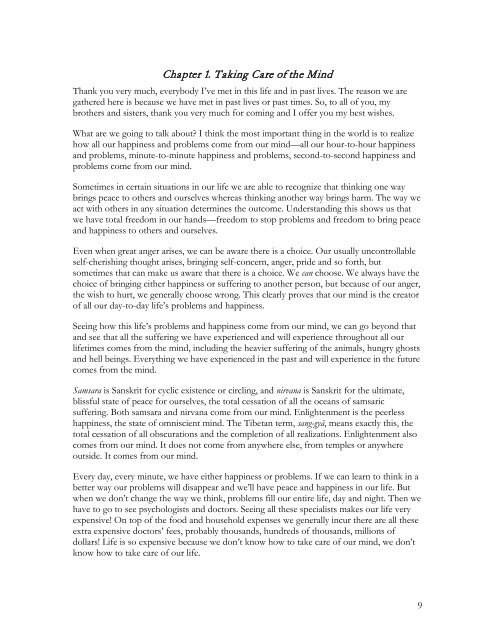Lama Zopa Rinpoche
55OTzl52A
55OTzl52A
Create successful ePaper yourself
Turn your PDF publications into a flip-book with our unique Google optimized e-Paper software.
Chapter 1. Taking Care of the Mind<br />
Thank you very much, everybody I’ve met in this life and in past lives. The reason we are<br />
gathered here is because we have met in past lives or past times. So, to all of you, my<br />
brothers and sisters, thank you very much for coming and I offer you my best wishes.<br />
What are we going to talk about? I think the most important thing in the world is to realize<br />
how all our happiness and problems come from our mind—all our hour-to-hour happiness<br />
and problems, minute-to-minute happiness and problems, second-to-second happiness and<br />
problems come from our mind.<br />
Sometimes in certain situations in our life we are able to recognize that thinking one way<br />
brings peace to others and ourselves whereas thinking another way brings harm. The way we<br />
act with others in any situation determines the outcome. Understanding this shows us that<br />
we have total freedom in our hands—freedom to stop problems and freedom to bring peace<br />
and happiness to others and ourselves.<br />
Even when great anger arises, we can be aware there is a choice. Our usually uncontrollable<br />
self-cherishing thought arises, bringing self-concern, anger, pride and so forth, but<br />
sometimes that can make us aware that there is a choice. We can choose. We always have the<br />
choice of bringing either happiness or suffering to another person, but because of our anger,<br />
the wish to hurt, we generally choose wrong. This clearly proves that our mind is the creator<br />
of all our day-to-day life’s problems and happiness.<br />
Seeing how this life’s problems and happiness come from our mind, we can go beyond that<br />
and see that all the suffering we have experienced and will experience throughout all our<br />
lifetimes comes from the mind, including the heavier suffering of the animals, hungry ghosts<br />
and hell beings. Everything we have experienced in the past and will experience in the future<br />
comes from the mind.<br />
Samsara is Sanskrit for cyclic existence or circling, and nirvana is Sanskrit for the ultimate,<br />
blissful state of peace for ourselves, the total cessation of all the oceans of samsaric<br />
suffering. Both samsara and nirvana come from our mind. Enlightenment is the peerless<br />
happiness, the state of omniscient mind. The Tibetan term, sang-gyä, means exactly this, the<br />
total cessation of all obscurations and the completion of all realizations. Enlightenment also<br />
comes from our mind. It does not come from anywhere else, from temples or anywhere<br />
outside. It comes from our mind.<br />
Every day, every minute, we have either happiness or problems. If we can learn to think in a<br />
better way our problems will disappear and we’ll have peace and happiness in our life. But<br />
when we don’t change the way we think, problems fill our entire life, day and night. Then we<br />
have to go to see psychologists and doctors. Seeing all these specialists makes our life very<br />
expensive! On top of the food and household expenses we generally incur there are all these<br />
extra expensive doctors’ fees, probably thousands, hundreds of thousands, millions of<br />
dollars! Life is so expensive because we don’t know how to take care of our mind, we don’t<br />
know how to take care of our life.<br />
9


